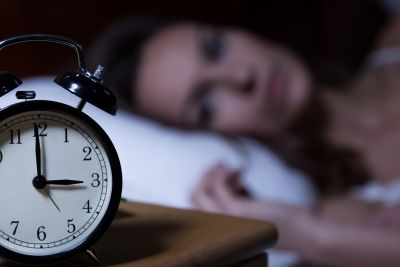Hormones play a crucial role in regulating the sleep-wake cycle, so any imbalances can significantly impact the quality of your sleep.
In this post, you’ll learn about the powerful relationship between hormones and sleep, the differences between men and women when it comes to hormone imbalances and sleep issues, and strategies to optimize your hormone levels for better, more restful sleep.
Several hormones are involved in regulating sleep—here are the most important ones.
Melatonin
Melatonin is produced by the pineal gland in the brain and helps regulate the sleep-wake cycle. Melatonin levels rise in the evening as it gets darker and darker outside, signaling to your body that it's time to sleep.
Light suppresses melatonin production, which is why exposure to bright lights before bedtime can disrupt sleep.
While all forms of light can influence your alertness and melatonin production, blue light has the biggest impact (which is why you should avoid it as much as possible before bedtime).
Cortisol
Cortisol, the “stress hormone,” plays a vital role in your body’s stress response. It also follows your circadian rhythm, with levels peaking in the morning to help with waking up and gradually decreasing throughout the day.
Chronic stress (also known as adrenal fatigue) can lead to elevated cortisol levels, which can disrupt sleep and cause insomnia or excessive sleepiness.
Growth Hormone
Human growth hormone (HGH) is released during deep sleep (slow-wave sleep) and plays a crucial role in tissue repair, muscle growth, and metabolism.
Sleep deprivation or poor sleep quality can impair HGH secretion, affecting your overall health and well-being.
Hormonal Differences in Sleep Quality Between Men and Women | Estrogen, Progesterone, and Testosterone
Women experience significant hormonal fluctuations throughout their lives that can impact their sleep quality. During the menstrual cycle, estrogen and progesterone levels rise and fall, affecting sleep patterns.
Higher estrogen levels are associated with improved sleep quality, increased REM sleep, and fewer sleep disturbances. Progesterone has sedative properties that can promote sleepiness.
Pregnancy is another time when hormonal changes can significantly impact sleep. The high levels of progesterone during pregnancy can cause excessive daytime sleepiness and increased sleep needs.
Postpartum, the rapid drop in hormones, combined with the demands of caring for a newborn, can lead to sleep deprivation and insomnia.
As women enter menopause, the decline in estrogen levels can cause sleep problems like insomnia and night sweats. Fortunately, hormone replacement therapy (HRT) is often able to alleviate these symptoms.
While men don't experience the same dramatic hormonal fluctuations as women, testosterone levels play a significant role in their sleep quality.
Low testosterone levels in men are associated with reduced sleep efficiency, increased sleep fragmentation, and a higher risk of sleep disorders like sleep apnea. Testosterone replacement therapy (TRT) may improve sleep quality in men with low testosterone levels.
Strategies to Optimize Hormone Levels for Better Sleep
Hormone replacement therapy, combined with lifestyle changes, can often significantly improve your sleep quality. Here are a few strategies to try.
Maintain a Consistent Sleep Schedule
Sticking to a regular sleep schedule helps regulate your body's internal clock and melatonin production. Try to go to bed and wake up at the same time every day, even on weekends.
Create a Sleep-Conducive Environment
Ensure the bedroom is dark, quiet, and cool to promote melatonin production and improve sleep quality. Consider using blackout curtains, earplugs, or a white noise machine to create an optimal sleep environment.
Limit Blue Light Exposure Before Bedtime
Avoid using smartphones, tablets, or laptops, which emit large levels of blue light, for at least an hour before bedtime, or try using blue-light-blocking glasses to reduce the impact.
Manage Stress
Chronic stress can lead to elevated cortisol levels, which can disrupt sleep. Try stress-reducing activities—like meditation, deep breathing exercises, or yoga—before bed to help lower cortisol levels and promote relaxation.
Exercise Regularly
Regular physical activity can help you regulate your hormone levels, reduce your stress, and improve your sleep quality.
Aim for at least 30 minutes of moderate exercise most days of the week, but try to avoid intense workouts close to bedtime—they can be overly stimulating and keep you awake.
Consider Hormone Replacement Therapy
If you think a hormonal imbalance is affecting your sleep quality, speak with a healthcare provider to get your levels tested.
They may recommend hormone replacement therapy, like estrogen replacement therapy for women or testosterone replacement therapy for men with low levels. Many of our clients report better sleep quality after they begin therapy.
The Relationship Between Sleep and Other Hormones
In addition to the hormones directly involved in sleep regulation, there are other hormones that can be affected by sleep quality.
Insulin
Poor sleep quality and sleep deprivation can lead to insulin resistance, increasing the risk of type 2 diabetes. Insulin resistance occurs when your body's cells become less responsive to insulin, leading to high blood sugar levels.
Leptin and Ghrelin
Leptin and ghrelin are hormones that regulate appetite. Leptin suppresses appetite while ghrelin stimulates it. Sleep deprivation can lead to decreased leptin levels and increased ghrelin levels, leading to increased hunger and cravings for high-calorie foods.
Thyroid Hormones
The thyroid gland produces hormones that regulate metabolism. Sleep deprivation can disrupt the production of thyroid hormones, leading to symptoms like fatigue, weight gain, and mood disturbances.
Don’t Let Your Hormones Ruin Your Sleep
Hormones play a vital role in regulating sleep quality—any imbalances can lead to sleep disturbances and health issues. Understanding the relationship between hormones and sleep while taking steps to optimize your hormone levels can improve your sleep quality and overall well-being.
If you're struggling with persistent sleep problems or suspect a hormonal issue, we can help. With the right strategies and support, you can improve your sleep quality and reclaim your nights, your days, and your life.
Learn more about HRT for women or TRT for men here. You can also schedule an appointment with a specialist today to discuss getting your levels tested.

